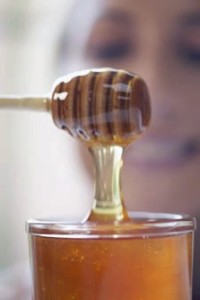 It is well known that honey has been used as an internal and external medication for centuries due to its antibacterial and anti-inflammatory properties. Raw honey is packed full of antioxidants, which are believed to be good to prevent certain diseases and conditions. Raw honey is believed to act similarly to allergy shots when ingested for the purpose of preventing allergies. It is believed that raw honey, rather than processed honey is what should be used for desensitization to pollens, because raw honey contains tiny bits of pollen. It is believed that when you ingest raw honey from your general area, you can build up immunity to the pollens local to the area where you live. It should be noted that most of the evidence that raw honey is good to prevent allergies is mostly anecdotal. You may hear more by word-of-mouth about honey being useful to prevent allergies.
It is well known that honey has been used as an internal and external medication for centuries due to its antibacterial and anti-inflammatory properties. Raw honey is packed full of antioxidants, which are believed to be good to prevent certain diseases and conditions. Raw honey is believed to act similarly to allergy shots when ingested for the purpose of preventing allergies. It is believed that raw honey, rather than processed honey is what should be used for desensitization to pollens, because raw honey contains tiny bits of pollen. It is believed that when you ingest raw honey from your general area, you can build up immunity to the pollens local to the area where you live. It should be noted that most of the evidence that raw honey is good to prevent allergies is mostly anecdotal. You may hear more by word-of-mouth about honey being useful to prevent allergies.
Raw honey differs from many other types of manufactured honey. Honey that has been heated or filtered may not be effective in preventing seasonal allergies. To get raw honey to treat allergies, you will likely need to contact a beekeeper in the same local area where you live. Many alternative health care practitioners believe that local honey, ingested over time will reduce your response to the pollens in your area. Because honey bought in your local grocery store may be pasteurized or highly filtered, you should go to a beekeeper or visit your local farmer’s market.
Most people like the taste of honey, but some may not care for it right off the spoon. However, raw honey makes a great sweetener in most drinks, including coffee and iced tea. For an added immunity boost, you can drizzle a little honey on your kids’ cereal or on toast each morning. You can also get creative and add honey in with other foods that are naturally sweet, such as in fruit cocktail, and fruit salads. Whether or not honey is a successful treatment to prevent allergies will be up to you to decide. If you didn’t get sick from allergies during allergy season, you may feel that honey actually worked to keep you allergy free. Thus, most people learn about honey as a treatment for allergies by word-of-mouth.
 While honey is believed to be good medicine by a lot of people, there are individuals who are allergic to honey, and should never try to treat their allergies with honey. You should always consult a physician before attempting to treat an allergy with honey. Natural remedies may be good for some people, but they may not necessarily be good for you. Many individuals believe that natural remedies are always better than traditional medicines; however, this is not always the case. If you plan to use raw honey for the treatment of allergies, it is important that your physician knows of your plans and deems it safe to do so.
While honey is believed to be good medicine by a lot of people, there are individuals who are allergic to honey, and should never try to treat their allergies with honey. You should always consult a physician before attempting to treat an allergy with honey. Natural remedies may be good for some people, but they may not necessarily be good for you. Many individuals believe that natural remedies are always better than traditional medicines; however, this is not always the case. If you plan to use raw honey for the treatment of allergies, it is important that your physician knows of your plans and deems it safe to do so.
Many people use raw honey to fight allergies by using honey instead of sugar. Instead of eating snacks laden with sugar, it is much healthier to replace those sweets with honey. Eating foods with high sugar content can deplete the body of vitamins and add many empty calories. It is believed that raw honey will not deplete your body of Vitamin C, like eating sugar will do over time. If the body is depleted of Vitamin C, the immune system could be weakened, so it is believed that raw honey is a better choice of sweetener. It is also believed that using raw honey as a sweetener, rather than using regular sugar, can be beneficial to boost the immune system, which can help prevent allergies and disease.
